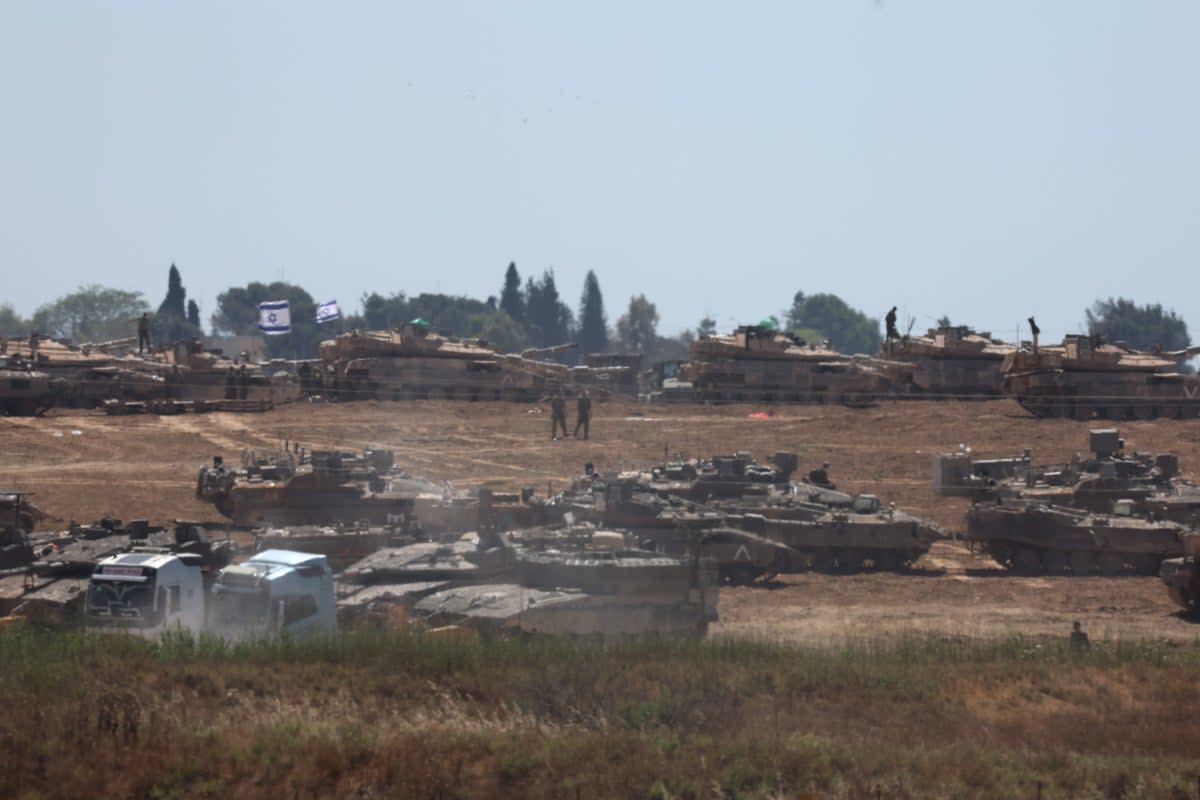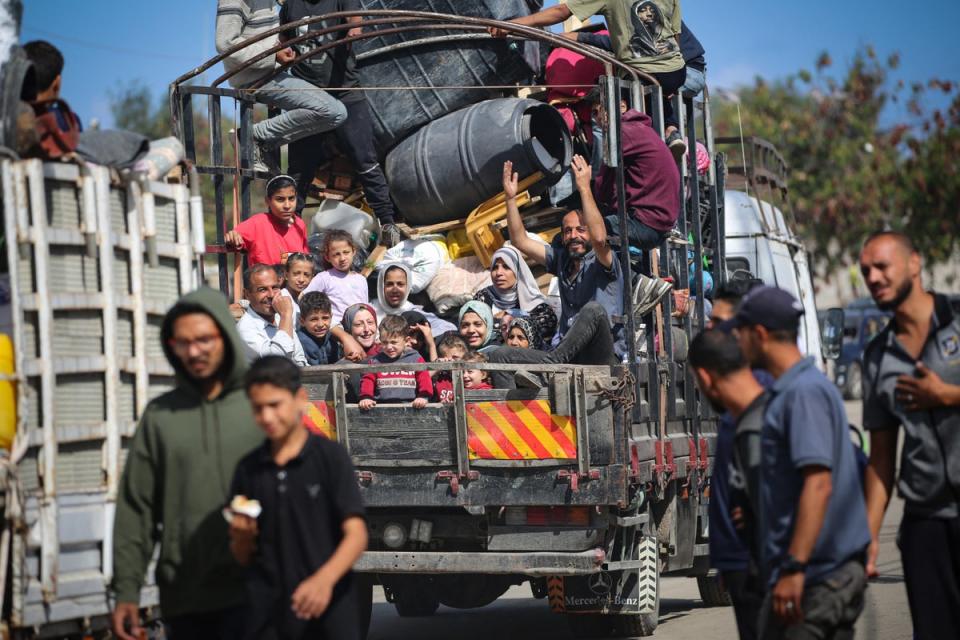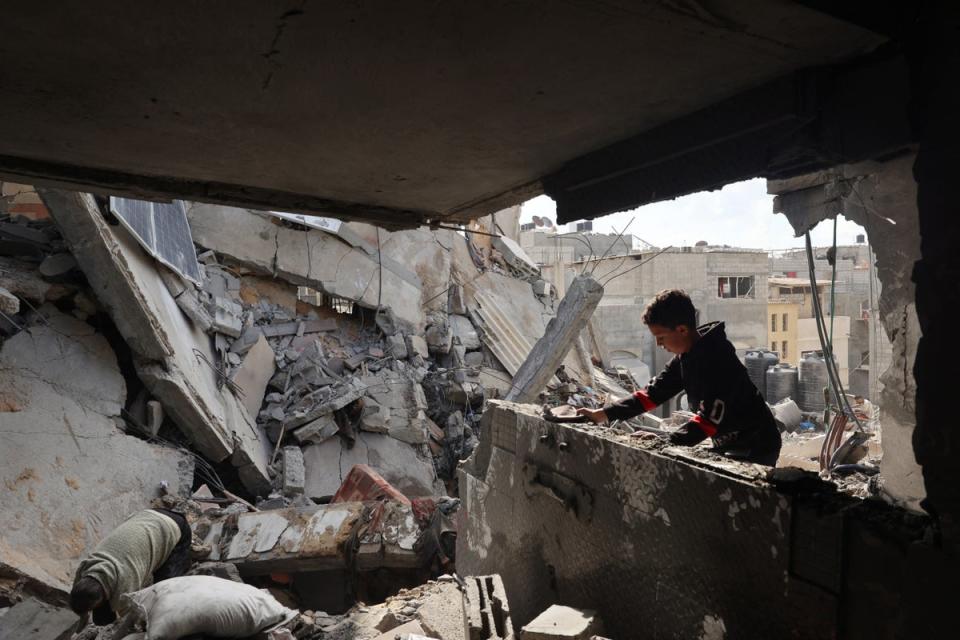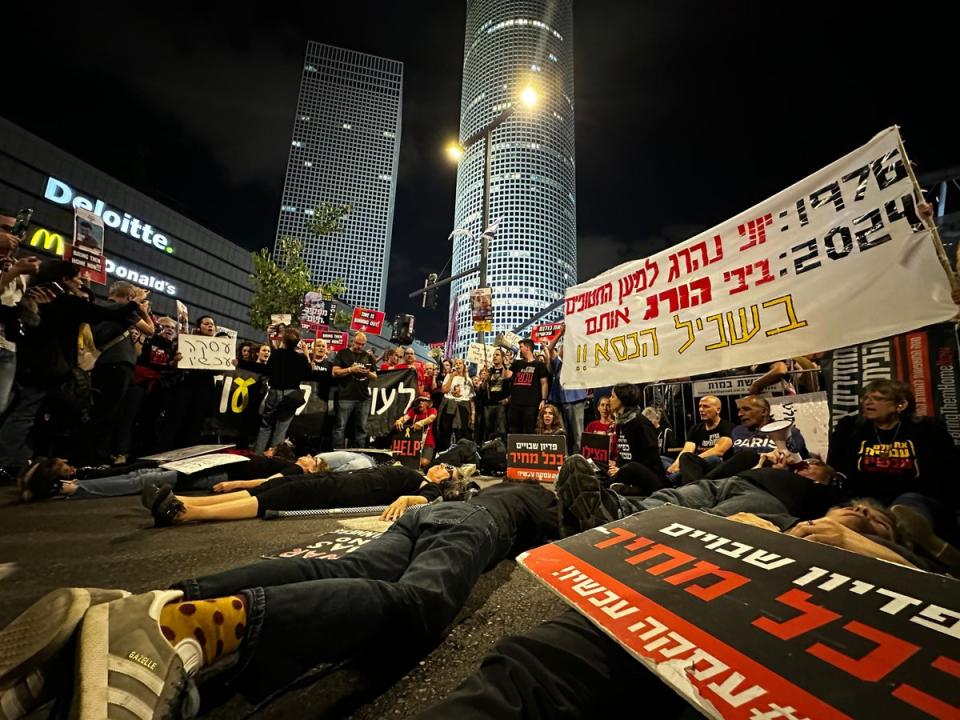Rafah residents face ‘the fire of hell’ as Israeli tanks seize border crossing

Gaza has entered the “darkest days of a seven-month nightmare” United Nations officials have said, warning that vital aid is being “choked off” after Israeli forces and tanks seized control of the main aid crossing in Rafah.
Civilians in the border city, which is sheltering over 1.4 million mostly displaced families, likened the bombardment to “the fire of hell” as “missiles fell like rain” while they scrambled to evacuate following orders from the Israeli military.
Despite pleas from its closest allies to hold off, Israel moved its tanks into east Rafah and captured the border crossing overnight on Tuesday, in what it called a “limited” operation meant to kill fighters and dismantle infrastructure used by Hamas militants. Israeli prime minister Benjamin Netanyahu called it an “important step” toward dismantling Hamas.
It came hours after Hamas announced it had accepted an Egyptian-Qatari mediated ceasefire and hostage proposal. Mr Netanyahu said that the proposal fell far short of Israel’s “essential” demands. Negotiations for a truce in Cairo are ongoing – with Israel saying it had sent officials to the Egyptian capital – but on a knife edge.
In Gaza, the UN warned that a full-scale assault on the area and continued closure of Rafah and Kerem Shalom crossings would have a “catastrophic” impact on hundreds of thousands of people mostly living in the tents there.
The UN’s Palestinian refugee agency, UNRWA, warned it had less than a day’s worth of fuel, needed to power trucks, the remaining hospitals, as well as water and sewage pumps.
Jens Laerke, the spokesperson for the UN’s humanitarian office, said the closures were the most effective way to put the aid response “in its grave”.

“Rafah and Kerem Shalom are main arteries of the humanitarian operation for not only Rafah but the entire Gaza strip, and have been currently choked off completely. That is catastrophic,” he told The Independent.
“There are very little in terms of stockpiles inside Gaza. There were still vastly inadequate amounts of aid coming into Gaza. The aid comes in and is distributed pretty much immediately.”
He said the start of the ground assault in Rafah was devastating for civilians who had nowhere to go as most of the strip had been “bombed into moonscapes” and was littered with unexploded weaponry.
“This is one of the worst mornings of this seven-month nightmare. Yesterday, we saw pictures of people celebrating [and] dancing in the streets. There was a glimmer of hope that finally we have a ceasefire, then just a few hours later, no.
“It’s soul-crushing. These are very dark days.”
Civilians in Rafah told The Independent they experienced “the most difficult night” of bombing since the war erupted seven months ago.
“It was like the fire of hell. I saw missiles fall like rain. Rockets with a very terrifying sound. Their bodies were still lying in the streets. There was continuous artillery shelling and airstrikes,” said Abu Yahya Zoroub, 37, who was near the crossing when Israel forces pushed in.
He said people were calling for help but it was near impossible for ambulances and first responders to reach the areas.
“It was like the fire of hell. I saw missiles fall like rain
Abu Yahya, in eastern Rafah
Food prices, meanwhile, have more than doubled, and families scrambled to evacuate – some walking, some using donkey carts and some in the backs of trucks.
“There will be a famine here,” Mr Zoroub added.
Israel has launched its most ferocious ever bombardment of Gaza and imposed a crippling siege in retaliation for Hamas’s bloody 7 October attack on southern Israel. Around 1,200 people were killed in the Hamas attack, while another 250 were taken hostage, including toddlers.
The Palestinian health ministry says Israel’s bombing has killed nearly 35,000 people, the majority of them women and children. The UN says restrictions on aid have created a “man-made famine” with half the 2.3 million strong population of the strip at catastrophic levels of hunger.
That is only expected to worsen if Israel escalates its ground offensive in Rafah, which Mr Netanyahu said is the last holdout for Hamas militants and an essential part of their battle for “victory”.
The Israeli military said its ground troops on Monday night “began a precise counterterrorism operation” based on intelligence that indicated Hamas was using Rafah for “terrorist purposes”.

The UN’s secretary general, Antonio Guterres, appealed to Israel and Hamas to spare no effort to get a truce deal and warned Israel that a full assault on Rafah would "be a strategic mistake, a political calamity, and a humanitarian nightmare."
“It would be tragic if weeks of intense diplomatic activity for peace in Gaza, yield no ceasefire. No release of hostages. And a devastating offensive in Rafah,” he said.
On Tuesday, the Palestinian Authority called on the United States to “intervene immediately” to prevent Israel from invading Rafah, the official Palestinian Wafa news agency said.
Talks were also continuing in Cairo for a ceasefire and hostage deal that could see in the first phase at least 33 Israeli hostages released in exchange for the release of hundreds Palestinian prisoners.
Sources close to the negotiations told The Independent that they had “cautious optimism” that a deal would eventually be signed, as the current proposal Hamas agreed to on Monday was based on a previous proposal drafted by Israel in late April.
Some sticking points including the use of the word “ceasefire” in the document had been resolved.
But others were still being battled out in the Egyptian capital – including the duration of the first phase and the fact that the deal would see female soldiers released too late in the process. Pressure is mounting from Israel’s closest ally, the US. The Independent understands that president Joe Biden had a tough call with Mr Netanyahu where Washington made it clear the Rafah offensive had to end and a hostage deal be signed.
We are talking about aid into Gaza being strangled
Tamara Al-Rifae/UNRWA
A State Department spokesperson said in an email on Tuesday: “We continue to believe that a hostage deal is in the best interest of the Israeli and the Palestinian people; it would bring an immediate ceasefire and allow increased humanitarian assistance into Gaza.”
In the interim, Rafah and Kerem Shalom crossings remain closed, crippling the humanitarian response.
Tamara al-Rifae, spokesperson for UNRWA, said that the agency’s most immediate concern was fuel for the delivery of aid, for hospitals, and for the water supply.
“As of yesterday, we had one day’s worth of operations with the fuel that we had. Because of the scarcity, the trickle of aid that's been going in, we do not have stockpiles of emergency aid supplies ready to be deployed as a contingency.” She added: “We are talking about aid into Gaza being strangled.”
A World Health Organization spokesperson said that the Rafah border crossing was also closed for the evacuation of sick and injured patients. Palestinian health officials said Tuesday that 140 wounded and sick people were supposed to cross from Gaza into Egypt today but were barred from doing so.
Mahmoud Gaith, 50, who fled eastern Rafah overnight, said there were “intense belts of fire” – when multiple bombs are dropped at the same time – as well as hundreds of artillery and air raids.

“Last night was one of the most difficult nights we have had since 7 October. They did not give people a chance to evacuate,” he said as he fled northwest.
“Now I do not know where my family will go. There is no safe place to move to. All areas are vulnerable to danger; even safe places do not have the necessities to live in; otherwise, they are full of displaced people.”
There is also growing concern among the families of the remaining 130 hostages, who are still believed to be in the besieged strip.
On Monday night, families of the hostages gathered outside the Israeli military headquarters in Tel Aviv demanding a ceasefire and the immediate return of their loved ones.
“‘This is the time to exert your influence on the Israeli government and all other parties concerned to ensure that the agreement comes through which will finally bring all our loved ones home,” they said in a statement.
Gil Dickmann, whose cousin Carmel, 39, is among the dozens of hostages still held in Gaza, told The Independent that families were sending a clear message to the Israeli war cabinet.
“The ball is in your court. Sign the deal and bring them home now,” he said.

 Yahoo News
Yahoo News 
